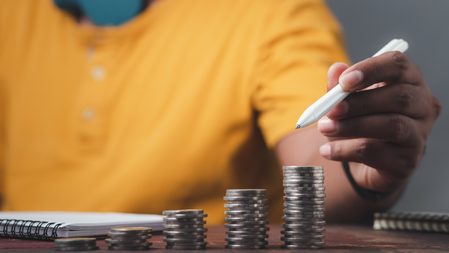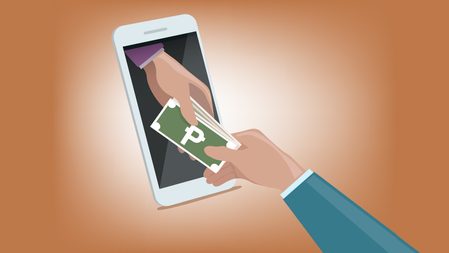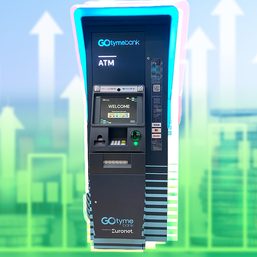SUMMARY
This is AI generated summarization, which may have errors. For context, always refer to the full article.
![[Finterest] What exactly does a bank do, and how can they help you?](https://www.rappler.com/tachyon/2022/09/shutterstock-philippine-peso.jpg)
MANILA, Philippines – Money may make the world go round, but what makes money go round? Banks.
Banks are like the behind-the-scenes managers of the financial world, quietly working to keep our money safe and our financial lives running smoothly. But have you ever stopped to wonder what exactly does a bank do with your money? Where does it go? And why do we even need banks in the first place?
To answer that, Rappler talked to one of the country’s most popular retail banks, Security Bank.
“The basic role of a bank in terms of the service that we provide is we take people’s deposits, and in exchange of taking people’s deposits, we pay them an interest rate,” Eduardo Olbes, Security Bank executive vice president and chief financial officer, told Rappler. “In a very high-level sense, it’s basically deposit services or loan services.”
Let’s break this down. When you put your money in a bank, it’s called a deposit. Think of it like giving your money to the bank to keep it safe for you. You can deposit money into different types of accounts, like a savings account, checking account, or time deposit account.
Now, here’s where it gets interesting (pun intended). When you deposit money into a savings account, the bank doesn’t just hold onto it; they also pay you something called interest. It’s a percentage of your balance that the bank adds to your account over time.
But before you get too excited, you won’t exactly be growing your wealth off that interest. For instance, Security Bank’s most basic savings account only pays 0.0675% interest per year. That means if you deposited P100,000 in your savings account, you will have earned – wait for it – P67.5 for the whole year.
Of course, there are more advanced financial products that can give you a much better rate of return, like treasury bonds and time deposits. In fact, this is where the bank comes in to offer its other set of services.
“If they find that they got extra funds, and they want to try to invest those extra funds, there is a third bucket of services that the bank can provide them, which is access to investments that otherwise they may not have access to without a bank,” Olbes said.
Where does your money go?
Like we said earlier, interest is the bank’s way of paying you for letting them use your money. But letting them use it for what exactly?
“As a bank, we use those deposits to support also making loans. And as a bank customer, they would also have the ability to tap the bank for their funding needs,” Olbes told Rappler. Security Bank executives added that, in their bank’s case, 70% of their loans go to medium and large-sized companies, while the rest goes to retail clients.
In essence, the bank takes your deposits and lends them out to other people and businesses who need to borrow money. Loans can go towards buying a car, starting a business, or even financing a multi-billion peso project to rehabilitate an airport. By lending out your deposits, banks help stimulate activity and growth in the economy.
Deposits can also be used in investments, like a bank’s unit investment trust fund or UITF. Similar to a mutual fund, a UITF is basically a pool of money that the bank manages and invests in a variety of assets. There are UITFs that attempt to replicate the performance of the stock market index, and there are also some that invest in real estate outside the Philippines.
But wait – you might be thinking – if the bank takes your deposits and lends it to someone else, how can you be sure that your money will still be there when you want to withdraw it? That’s where reserve requirements come in. Banks are required by law to hold a certain percentage of their deposits in reserve. Think of this as the amount that they have to keep on hand at all times to meet customer withdrawals and other financial obligations. This reserve requirement helps maintain the stability of the banking system and prevent bank runs.
Why use a bank?
Security Bank’s chief finance officer told Rappler that their clients usually start their banking relationship either as a depositor or borrower.
“As the customer grows or as they go through their life journey, their needs will change,” Olbes said. “They can start either/or, meaning it could start with a loan or a deposit. Normally, it’s different starting points for different individuals. You could just say, ‘I only want to deposit something, and I don’t want to loan,’ and we’d be perfectly happy.”
When it comes to deposit accounts, the Philippines is still rather behind. As much as 44% of the country’s bankable population remains outside of the formal financial system. But the good news is that the number of households that have an account with a bank is growing.
In the Consumer Expectations Survey for Q1 2024, the Bangko Sentral ng Pilipinas (BSP) found that the percentage of households with savings increased to 33.5% in the first quarter of 2024, higher than the 29.1% in the previous quarter. And among those savers, 76.5% kept their savings in a bank, up again from the 73.5% in Q4 2023.
“In terms of savings and investment, my consistent advice is it’s very important to start the savings journey as early as you can because you get to maximize the power of compounding – compound interest – which will help you prepare for the future,” Olbes said. “Small amounts can make a difference”
Banks also provide a vital role in providing access to credit, especially in a country like the Philippines, where the number of people who rely on loans is high. The same BSP survey showed that 1 in 4 households availed themselves of a loan in the past 12 months, with most households using the loan proceeds to buy basic goods (49.7%), fund business start-up or expansion (24.8%), help with education-related (19.1%) or health-related (14.0%) expenses, or pay for other debts (8.2%) – all of which a bank can aid clients to address.
The Security Bank executive also advised clients who start off with a loan to also open up a deposit account because it would make their life easier. He added that the bank “could automatically transfer your loan proceeds to your deposit account, and then to pay the monthly amortization, we could just do an auto debit.”
Besides safekeeping your money and lending a helping hand, banks also simply make it easier to pay for goods and services, especially with the advent of digitalization. Gone are the days where you’d have to line up for hours to withdraw cash, pay bills, or send money. With digital banks emerging and traditional banks embracing tech too, you can do all that from the comfort of a smartphone. – Rappler.com
Finterest is Rappler’s series that demystifies the world of money and gives practical advice on how to manage your personal finance.
Add a comment
How does this make you feel?






![[Finterest] Private banking: How the wealthy keep the money within the family](https://www.rappler.com/tachyon/2024/07/Finterest-wealth-between-the-family.jpg?resize=257%2C257&crop=425px%2C0px%2C1080px%2C1080px)


![[Finterest] Credit card 101: How does it work, and which one is for you?](https://www.rappler.com/tachyon/2024/06/credit-card-stock-photo.jpg?resize=257%2C257&crop_strategy=attention)
![[Finterest] How deposit insurance keeps your money safe when a bank closes](https://www.rappler.com/tachyon/2022/09/shutterstock-philippine-peso.jpg?resize=257%2C257&crop=329px%2C0px%2C900px%2C900px)
![[Finterest] How to earn on TikTok Shop, according to the app’s top vendors](https://www.rappler.com/tachyon/2024/05/tiktok-shop-top-vendors-1.jpg?resize=257%2C257&crop=310px%2C0px%2C720px%2C720px)
There are no comments yet. Add your comment to start the conversation.